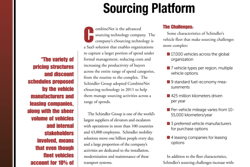Stamford, Ct.—Sept. 15, 2011—A report sponsored by
Basware, an enterprise purchase-to-pay provider, and conducted by
professional association The Institute of Financial Operations indicated that
companies are becoming more sophisticated in how they approach procurement and
finance. While e-invoicing implementation may be gradual, there has been clear
growth since last year as companies begin to understand its benefits.
It’s striking that the number one financial priority for companies in 2011 is
improving operational efficiency – far surpassing their focus on increasing
profits and top-line performance. The great majority of organizations surveyed
recognize the importance of e-invoicing in helping them achieve this
objective, and they also realize the negative consequences that come from
primarily relying on manual processes.
Indicating an increase in invoice processing since last year, the 2011 e-
invoicing survey results show that approximately one-third of those who took
the survey reported that their employers did not in any way use e-invoicing.
That compares with a similar question from last year’s survey in which 58
percent responded that their companies used a manual data capture and approval
process for receiving invoices.
The majority of survey respondents (nearly every respondent), however, think
that there is room for improvement in how companies leverage technology to
implement key invoicing processes. Despite an understanding of the benefits
of e-invoicing in terms of cost savings and increased efficiency, many
companies have been to slow to adopt it.
"The research sponsored by Basware shows us how much promise the technology
has, but also how far we have to go in terms of educating financial leaders to
make the investment and commitment,’’ said Thomas M. Bohn, president and CEO
of The Institute.
The survey also identified the challenges respondents face in sending and
receiving non-electronic invoices, including time spent entering and scanning
invoices and securing their approvals, as well as misplaced or lost invoices.
“The insights gathered from our research with The Institute of Financial
Operations help Basware better meet the needs of our customers as we partner
with them to achieve excellence in procurement and finance. The results of
this survey are very revealing, and they underscore the significance that
companies place on automating their key financial processes,” said Bob Cohen,
vice president of Basware, Inc. “Organizations that have low levels of
automation in capturing, transmitting, and processing invoices lack real-time
visibility into expenses, making it difficult for them to manage spend, cash
flow, and working capital. Without visibility, it’s also hard for procurement
and finance departments to share information, further clouding the financial
picture.”
Companies that took part in the survey noted that speeding up invoicing
processes and reducing invoicing costs were the most compelling reasons to
implement e-invoicing. These companies also recognize the benefits provided by
an open network, where buyers and suppliers can easily transmit e-invoices and
purchase orders without the need to install the proprietary technologies that
traditional networks typically require. They value the increased efficiency
and cost savings that such an open network delivers.
Almost half of research respondents said that they are able to receive and
process invoices electronically, and a quarter of respondents are able to send
invoices electronically. However, 76 percent of these respondents indicated
that they receive e-invoices as e-mailed PDFs and 50 percent of them print out
the e-invoices for further processing, which does not allow them to take
advantage of the full benefits that true e-invoicing offers, such as increased
AP automation, improved invoicing quality, and reduced manual errors.
“While there is increased interest in improving e-invoicing capabilities, most
companies are still at the very beginning stages. Basware is committed to
helping companies activate e-invoicing in their organizations so they can
fully take advantage of all of the benefits e-invoicing offers,” Cohen said.
Supporting survey findings that e-invoicing adoption is growing, the U.S.
federal government has just recently mandated that by the end of 2012 all
treasury bureaus must implement the Internet Payment Platform (IPP), an
electronic invoicing processing solution, and that all of its commercial
vendors submit invoices by IPP by the end of 2013.
A total of 434 respondents took the survey during the spring and summer, with
the largest number representing accounts payable managers and supervisors.
Other titles included chief financial officer, controller, treasurer,
financial executive, accounts receivable manager, accounts receivable
supervisor, and operations manager. Most (81.8 percent) were in North America,
with 16.3 percent in Europe and a few in South America, Australia, and Asia.
The full report is available at www.financialops.org/research, at no charge to
members and for purchase by nonmembers.











